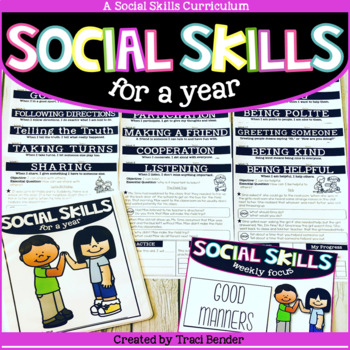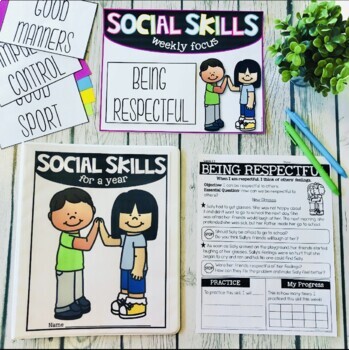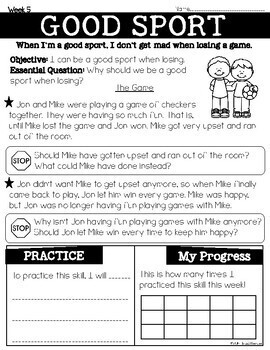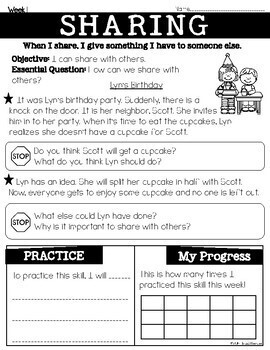Social Skills For A Year {A Year-long Curriculum}
- PDF
What educators are saying
Also included in
- This is a custom bundle and includes:Writing FramesThe Ultimate Behavior ToolboxSpelling for a YearSolve a StorySocial Skills for a YearFry's Sight Word Rings (first 100)Fry's Sight Word Rings (101-200)Purchase it yourself, or find out how you can design your own custom bundle and save 15% too by clPrice $69.90Original Price $82.25Save $12.35
Description
Social Skills For a Year includes 36 social skills lessons! Each week, a new social skill is introduced and explicitly taught throughout the week. Each lesson provides a kid-friendly definition of the skill, an objective, and an essential question. Each social skill is introduced with a short passage that connects learning to real life situations students can relate to, with two “Stop and Discuss” checkpoints to create opportunities for conversation and guide students with critical thinking and reflection. Students practice the skill throughout the week by setting a goal and track their progress.
1) On day 1, (Monday) teachers write the weekly social skill focus on the board or use the weekly focus poster provided in this set. This will be the social skill focus that students will practice and teachers will emphasize for the entire week.
2) The teacher provides a copy of the weekly social skill lesson to each student.
3) The teacher and students will read the definition of the skill, the objective, and essential question and discuss. I usually complete an anchor chart at this time with my students.
4) Read the first part of the short passage.
5) Stop and discuss.
6) Read the second part of the passage.
7) Stop and discuss. You could also choose to have students respond to the discussion questions in a social skills journal.
8) Practice. After completing the lesson and discussions, students decide how they will practice the skill during the week by completing the “Practice” section.
9) Each time they practice the skill, they can record it in the “My Progress” section. They can color the boxes in, make checkmarks, place a sticker, etc. The “My Progress” section can even be carried out beyond the focus week by having students store their collection of social skill lessons in a binder or 3-prong folder. A color and black and white binder/folder cover page is also provided in the set if you choose that option. This also allows students and teachers to easily revisit a social skill with the class or even an individual or group of students.
Although a Lesson Sequence has been included, social skills can be taught in any order. Teachers may find the need to teach a particular social skill at a time when a particular behavior is on the rise in the classroom. Teachers may also decide that they only need to use the social skill lessons with certain students.
Lesson Sequence:
Week 1: Sharing
Week 2: Taking Turns
Week 3: Telling the Truth
Week 4: Following Directions
Week 5: Good Sport
Week 6: Impulse Control
Week 7: Asking for Help
Week 8: Listening
Week 9: Cooperation
Week 10: Making a Friend
Week 11: Participation
Week 12: Being Patient
Week 13: Being Respectful
Week 14: Good Manners
Week 15: Being Helpful
Week 16: Being Kind
Week 17: Greeting Someone
Week 18: Being Polite
Week 19: Caring
Week 20: Accepting No
Week 21: Praising Others
Week 22: Making Eye Contact
Week 23: Accepting Criticism
Week 24: Showing Empathy
Week 25: Giving Compliments
Week 26: Resolving Conflicts
Week 27: Apologizing
Week 28: Encouraging Others
Week 29: Staying on Task
Week 30: Being a Good Listener
Week 31: Accepting Differences
Week 32: Asking Permission
Week 33: Interrupting
Week 34: Negotiating
Week 35: Compromising
Week 36: Respecting Space






